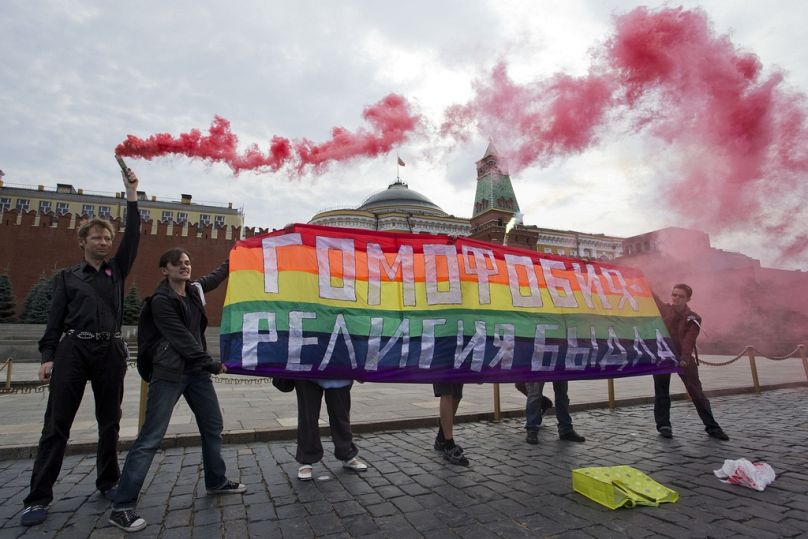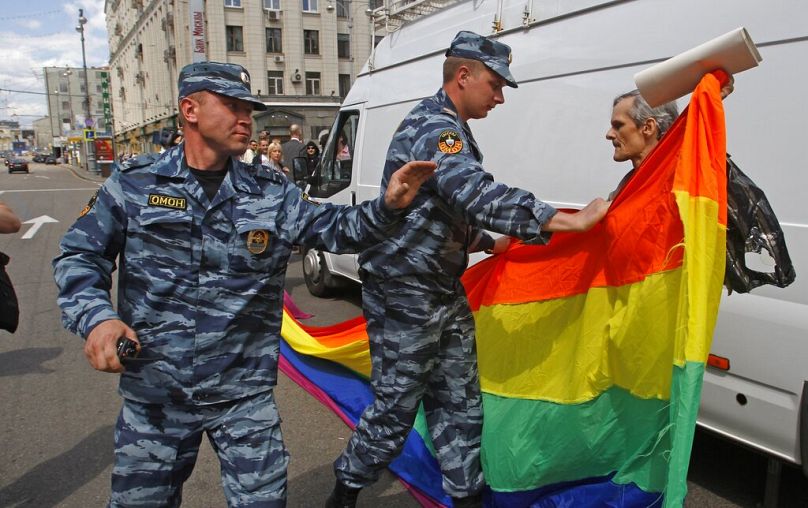Draconian laws and repression are forcing Russia's LGBT community out of the country, but those who cannot escape face an increasingly grim fate.
“My friends and I definitely feel very insecure and isolated,” said Sophia Agapov, a member of St Petersburg's LGBT community. “Literally every single step can lead to prosecution.”
 ADVERTISEMENT
ADVERTISEMENT
 ADVERTISEMENT
ADVERTISEMENT
“It's like a second corona lockdown. It is better to stay home,” she told Euronews via text.
Over the weekend, gay-friendly nightclubs, bars and saunas in central Moscow were raided by police. The heavy-handed blitz – which reportedly saw people ordered to lie face down - came one day after Russia's top court banned the "international LGBT movement," claiming it was “extremist”.
That’s despite no LGBT "movement" formally existing.
Though she had already been trying to leave since the February 2022 Ukraine invasion, Agapov now hopes to escape Russia soon.
“It's just very hard to do if you are not very wealthy or an IT specialist,” she said. “I am not going to seek asylum as, in my view, it is the last resort. My house hasn’t been destroyed by a bomb and I am not an LGBT activist who can be sent to prison.”
Attacks on LGBT rights in Russia are far from new.
“I was not surprised at this decision,” said Professor Richard Mole Director of the School of Slavonic and East European Studies at UCL. “Whenever things are going badly for the Russian government they need a distraction.”
He cites a long list of examples. Following protests over Vladimir Putin's reelection in 2013, Moscow introduced a highly controversial "gay propaganda" law.
Called by Human Rights Watch (HRW) a “classic example of political homophobia”, it banned informing children about lesbian, gay, bisexual, and transgender relationships.
Again in 2022, with the Ukraine war “not going so well”, Mole cites how Putin extended the controversial law to all ages and ramped up fines to 400,000 rubles (€4,000) for offenders.
Many LGBT Russians with connections, money and education have left to the West over the years, but that doesn't apply to everybody. Those who do not have these advantages face increased state repression.
“Our social media can be used against us,” said queer woman Agapov, noting she was now hastily deleting online images from pride events she visited in the past - “just in case”.
“People have been previously arrested for posting political opinions, it is likely to continue with ‘extremist opinions’ shared on Twitter," she feared.
Recognising this "state violence", Dr Charlie Walker, comparative sociologist and Co-director of the Centre for Eastern European and Eurasian Studies at the University of Southampton, describes how anti-LGBT policies have fuelled homophobic vigilantism.
He points to cases of men pretending to be gay on dating apps and murdering their date to "defend Russia" or drunken fights where LGBT people are killed, with the authorities taking a lax approach to these crimes.
Center for Independent Social Research found that violence against LGBT people in Russia approximately doubled within five years after the "gay propaganda" law was passed in 2013.
"It's not safe anymore as anyone can turn out to be aggressive and willing to report us. People have generally become more hostile," Agapov told Euronews. "It has never been this way in my lifetime."
'Homosexuality is a Western disease'
The grim situation has forced people underground.
Young LGBT Russians feel heightened social isolation and alienation as a result of their sexuality, according to a report by HRW, which also found that harassment, bullying and discrimination from peers had spiked.
"It is normal for a human being to look for the love of your life, to seek for your significant other. However, you are safer if you are single now," said Agapov. "The couples I know have to be very, very cautious in public and pretend to be ‘friends’ even more often than before.
"Personally I probably won’t start a new relationship until I leave the country," she continued.
Compounding these issues is that there are no anti-discrimination laws in Russia, meaning people can be fired or kicked out of their housing due to their sexuality.
According to sociologist Walker, Putin is ultimately pushing this ultra-conservativism to cement his grip on power.
He claims the Russian leader invokes the LGBT community - which is more visible in the West - to argue that Russian society and traditions are under siege by Western values.
"LGBT people are used as a symbol of foreign threat," Walker explained. "Part of the attempted legitimacy of the Putin regime is protecting the special status of Russia as a unique culture, under threat from what he sees as immoral political and cultural developments in the West."
"It's a populist move," he added.
Though homosexuality was legalised in Russia in 1993, Mole explains that anti-LGBT sentiment resonates with some people because the appearance of this community is "closely associated" with the economic collapse and breakdown of the Soviet Union in the 90s. Orthodox religious sentiment in the population also plays a part.
'A terrible rainbow plague'
As the Ukraine war drags on, experts told Euronews they feared Moscow would double down on its homophobia and increasing authoritarianism.
"The only way this is going to move in a different direction is after the Putin regime comes to an end," claimed Walker.
Meanwhile, Mole also feared the Russian leader would not stop there. He told Euronews that Russia would likely pursue more discriminatory policies, with elections looming in 2024.
“Putin is a creative man,” he said, suggesting up next could be taking children away from LGBT parents or re-criminalising homosexuality.
“I am not sure what he would do after that.”












